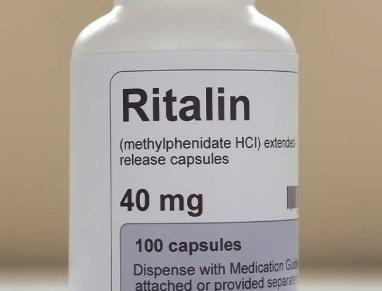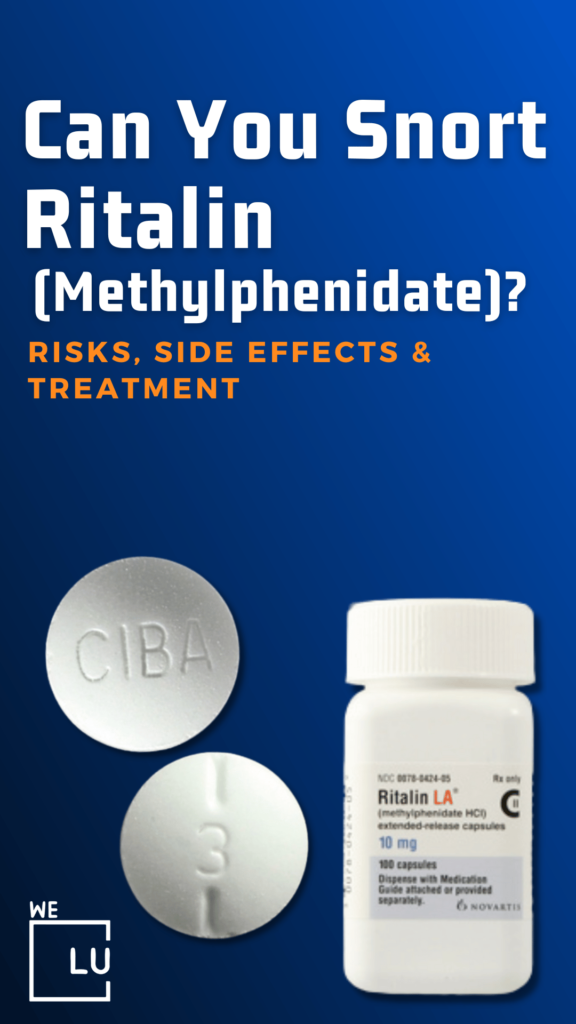Can You Snort Ritalin (Methylphenidate)?
Ritalin, a trade name for the prescription drug methylphenidate, is a central nervous system stimulant. (Its effects are similar to, but more potent than, caffeine and less potent than amphetamine.) Ritalin often is prescribed to treat individuals who are diagnosed with ADD (attention deficit disorder) or ADHD (attention deficit hyperactivity disorder).
Methylphenidate is a central nervous system depressant that’s used to treat attention-deficit hyperactivity disorder (ADHD). It’s sold in medications like Ritalin, and it’s often the first treatment option that doctors consider when they’re looking for pharmacological remedies for ADHD. As a stimulant, it can cause a euphoric mood-lifting effect when it’s taken in a high enough dose. In regular prescribed doses, it can cause increased alertness, focus, and wakefulness without any significant intoxicating effects.
Ritalin can be abused as a recreational and a performance-enhancing drug. Recreational users are typically looking for a high similar to cocaine or amphetamines. Ritalin isn’t as potent as illicit stimulants like cocaine and meth, but in high doses, it can deliver a significant euphoric high. However, high doses can cause serious side effects. Ritalin snorting increase their risk of overdosing on the drug because the drug bypasses the digestive tract and instead goes straight to the barrier between the blood and brain. This can increase both the onset and intensity of the effects caused by the drug.
What is Ritalin (Methylphenidate)?
Ritalin. or Methylphenidate hydrochloride—the generic for Ritalin, is a stimulant prescribed for attention deficit hyperactivity disorder (ADHD) treatment and to manage symptoms of narcolepsy (sleep disorder), but it also has the potential for abuse — begging the question, “can you snort Ritalin?” It affects the parts of the brain and central nervous system (CNS) that control impulses and hyperactivity. Ritalin is one of the trade names for the drug known as methylphenidate. Other brand names can include Concerta, Methylin, and Metadate. Methylphenidate was first approved by the U.S. Food and Drug Administration in 1955 for treating what was then referred to as hyperactivity [1].
Ritalin is prone to abuse, just like other stimulants. In addition, its ability to improve concentration means some people use it to boost cognitive ability. Abusing Ritalin, such as by crushing and snorting it, is dangerous because it can lead to irregular heart rate, fever, heart failure, and seizures at high doses. Over time, crushing and snorting Ritalin can also result in severe cardiovascular issues, anger, and psychotic symptoms such as paranoia. If abruptly discontinued, it is associated with Ritalin withdrawal symptoms like fatigue, depression, and sleep disturbances. Snorting Ritalin can also lead to a more intensely realized high—a phenomenon that may increase the risk that a user will become addicted.

Skip To:
Learn More:
- How Long For Ritalin To Leave Your System?
- Can You Inject Ritalin?
- Ritalin vs Cocaine
- Ritalin Withdrawal Symptoms, Timeline, Effects & Risks
- How Long Does Vyvanse Stay in Your System?
- Adderall and Sex Drive Connection, Side Effects, Addiction Treatment
- Withdrawal Symptoms of Prescription Drugs
- Amphetamine Detox
- Amphetamine Addiction
- Vyvanse Withdrawal Symptoms, Timeline, & Detox Treatment

Get Your Life Back
Find Hope & Recovery. Get Safe Comfortable Detox, Addiction Rehab & Dual Diagnosis High-Quality Care.
Hotline(844) 597-1011Ritalin (Methylphenidate) Drug Facts
What is Ritalin (Methylphenidate)?
Ritalin, a trade name for the prescription drug methylphenidate, is a central nervous system stimulant. (Its effects are similar to, but more potent than, caffeine and less potent than amphetamine.) Ritalin often is prescribed to treat individuals (mostly children) who are diagnosed with ADD (attention deficit disorder) or ADHD (attention deficit hyperactivity disorder).
Ritalin Drug Warning
CNS stimulants, including Ritalin and Ritalin-SR, other methylphenidate-containing products, and amphetamines, have a high potential for abuse and dependence. Assess the risk of abuse prior to prescribing, and monitor for signs of abuse and dependence while on therapy
Methylphenidate Drug Fact Sheet Made Publicly Available by the DEA
Ritalin Abuse Statistics
In 2016, nearly 2 million Americans over the age of 12 reported the abuse of prescription stimulants like Ritalin. The yearly Ritalin abuse rate is estimated to be about 4%, and those most likely to abuse Ritalin are white males who abuse other drugs and are affiliated with a fraternity.
85%
The U.S. manufactures and consumes approximately 85 percent of the world’s supply of prescription stimulants, including Ritalin.
Source: NCBI
50%
According to the Monitoring the Future survey by the National Institute on Drug Abuse (NIDA), more than 50 percent of the students who misused Ritalin and other prescription stimulants said a family member or friend gave them the drugs.
Source: NIDA
2 million
In 2016, nearly 2 million Americans over the age of 12 reported the abuse of prescription stimulants like Ritalin.
Source: SAMHSA
How Does Ritalin Work In The Body?
Ritalin works by stimulating the brain chemicals dopamine and norepinephrine, chemicals associated with control and attention. Dopamine also has strong associations with pleasure and reward. Norepinephrine mobilizes the brain and body to get ready for action and is involved in the fight-or-flight response. When taken in larger doses than prescribed, Ritalin produces euphoria, increasing the potential for addiction in some individuals.
Stimulant drugs like Ritalin are usually abused to enhance performance by speeding up physical responses and mental processing, suppressing appetite, or experiencing euphoria. They may appeal to individuals with food addiction, eating disorders, or problems with obesity, because of the energy-releasing effects and appetite-suppressant. People who take Ritalin for these reasons may have emotional vulnerabilities that could potentially contribute to addiction.
Ritalin Uses
Ritalin is used to treat attention deficit disorder (ADD), attention deficit hyperactivity disorder (ADHD), and narcolepsy (sleep disorder). Ritalin should be used as a part of a total treatment program for ADHD that may include counseling or other therapies. Off-label uses of methylphenidate (Ritalin) include treatment for fatigue in patients with cancer, refractory depression in the geriatric population, apathy in Alzheimer’s disease, and enhancing cognitive performance (e.g., memory). The efficacy of methylphenidate (Ritalin) for its off-label uses varies from limited to moderate.
Since it can be abused as a cognitive enhancer, it is a federally controlled Schedule II substance. Drugs are classified as schedule II drugs if they are determined to have a high potential for misuse, dependence, and addiction. If you have a history of substance use problems, it’s important to let your doctor know before taking this medication.

Is Snorting Ritalin Safe?
Taking any drug for recreation poses risks, and snorting it is never safe. Stimulants such as Ritalin are often abused via insufflation. Snorting Ritalin is meant to speed up their effects. Snorting Ritalin and other ground-up prescription medication of any kind is dangerous for the following reasons:
- It is usually not how the drug was intended to be used in the first place.
- Ritalin snorting encourages abuse and addiction, as it causes a person to feel the drug’s effects faster.
What Happens If You Snort Ritalin?
Ritalin may be harmful to the nasal membrane. Nasal membranes are delicate and prone to injury. Because of snorting Ritalin, the speed at which a the drug enters the bloodstream can also cause uncomfortable side effects.
- Vomiting
- Nosebleeds
- Constipation
- Restlessness
- Faster heart rate
- Lightheadedness
The following are some extreme side effects of regularly snorting Ritalin:
- Aggressive behavior
- Psychosis
- Toxicity (toxic shock)
- Death
Get Help. Get Better. Get Your Life Back.
Searching for Accredited Drug and Alcohol Rehab Centers Near You?
Even if you have failed previously and relapsed, or are in the middle of a difficult crisis, we stand ready to support you. Our trusted behavioral health specialists will not give up on you. When you feel ready or just want someone to speak to about therapy alternatives to change your life call us. Even if we cannot assist you, we will lead you to wherever you can get support. There is no obligation. Call our hotline today.
(844) 597-1011Why Do People Snort Ritalin?
Although the primary use of this drug is to treat attentional deficits, some individuals abuse it recreationally as a party drug to get “high.” Others abuse it to help improve performance in sports because t it provides increased energy and focus. In any event, many people who abuse it end up wanting to withdraw from the drug and function naturally. How long do Ritalin withdrawal symptoms last? The duration of the physical symptoms of Ritalin withdrawal generally lasts from one to three weeks, depending on the length of the addiction and how high the dosages were. The Ritalin withdrawal period is typically associated with a “crash” that is accompanied by fatigue, poor concentration, and depression.
How Ritalin Is Snorted?
This drug is usually crushed until it becomes a fine powder and then snorted to intensify its high. Snorting Ritalin results in large doses of methylphenidate entering the bloodstream almost immediately. This is especially dangerous with the extended-release formula. There is no medical reason to snort this medication. Snorting Ritalin can be dangerous. An overdose of this drug can cause heart problems, psychotic symptoms, and even death.
The “means of administration” refers to the way a drug enters your bloodstream. First, it has to pass through the liver and the blood-brain barrier. Many chemicals are filtered out at these roadblocks, but some make it through.
You can take a drug in a variety of ways, including orally, intranasally, sublingually (under the tongue), transdermally (as a patch), and intravenously. However, most drugs are better at making into the bloodstream through certain means, which is called bioavailability. In other words, the drug’s effects might be fast-acting and more intense through certain entry points.
Physical Effects Of Ritalin
According to the National Center for Biotechnology Information (NCBI) [3], insomnia and nervousness are the most commonly reported adverse effects in patients using methylphenidate (Ritalin). Other frequent side effects mainly involve the CNS (dizziness, headache, tics, restlessness/akathisia), gastrointestinal (nausea/vomiting, dry mouth, decreased appetite, weight loss, abdominal pain), and cardiovascular systems (tachycardia, and palpitations).
What happens if you snort ritalin? People who take this drug are more prone to become easily agitated, irritable, or depressed and go through mood swings/lability. Some may even develop blurry vision or decreased libido. Stroke and myocardial infarction also have been observed in adults. Due to the risk of such fatal side effects, it is advisable to avoid Ritalin in people with a structural cardiac abnormality, cardiomyopathy, or arrhythmias.
First-class Facilities & Amenities
World-class High-Quality Addiction & Mental Health Rehabilitation Treatment
Rehab Centers TourRenowned Addiction Centers. Serene Private Facilities. Inpatient rehab programs vary.
Addiction Helpline(844) 597-1011Proven recovery success experience, backed by a Team w/ History of:
15+
Years of Unified Experience
100s
5-Star Reviews Across Our Centers
10K
Recovery Success Stories Across Our Network
- Low Patient to Therapist Ratio
- Onsite Medical Detox Center
- Comprehensive Dual-Diagnosis Treatment
- Complimentary Family & Alumni Programs
- Coaching, Recovery & Personal Development Events
Effects Of Ritalin on the Brain
What happens if you snort ritalin? Investigators funded by the National Institute on Drug Abuse have shown that the medication methylphenidate (Ritalin), can cause physical changes in neurons in reward regions of mouse brains—in some cases, these effects overlapped with those of cocaine. Both methylphenidate (Ritalin) and cocaine are in the class of drugs known as psychostimulants.
“Studies to date suggest that prescribed use of Ritalin in patients with ADHD does not increase their risk for subsequent addiction. However non-medical use of this drug and other stimulant medications, can lead to addiction as well as a variety of other health consequences,” said NIDA Director Dr. Nora Volkow. ” [4] “Methylphenidate, which is thought to be a fairly innocuous compound, can have structural and biochemical effects in some regions of the brain that can be even greater than those of cocaine,” stated Dr.Yong Kim, lead author of the study. “
Ritalin Overdose
The first step in a Ritalin overdose is to immediately contact a poison control center or a hospital for the necessary management steps. Doses that exceed 60 mg of the IR (immediate-release) formulation or 120 mg of the ER (extended-release) formulation can be considered toxic [5]. If the overdosed quantity is unknown, look for signs and symptoms such as:
- Tremors
- Hyperreflexia
- Convulsions
- Euphoria
- Confusion
- Hallucinations
- Delirium
- Flushing
- Fever
In addition to the common adverse effects mentioned above. Supportive care with supplemental oxygen, IV fluids and external cooling methods is the mainstay of Ritalin overdose treatment. Multiple studies have shown that benzodiazepines are an option, especially if dystonia, agitation, or convulsions are present.
World-class, Accredited, 5-Star Reviewed, Effective Addiction & Mental Health Programs. Complete Behavioral Health Inpatient Rehab, Detox plus Co-occuring Disorders Therapy.
CALL(844) 597-1011End the Addiction Pain. End the Emotional Rollercoaster. Get Your Life Back. Start Drug, Alcohol & Dual Diagnosis Mental Health Treatment Now. Get Free No-obligation Guidance by Substance Abuse Specialists Who Understand Addiction & Mental Health Recovery & Know How to Help.
Ritalin Addiction Treatment
There is a strong link between mental health and substance abuse. Individuals who struggle with mood disorders like depression, ADHD, and anxiety are more susceptible to developing an addiction to drugs or alcohol, often to self-medicate symptoms of their underlying mental health condition. These co-occurring disorders can make each other worse without proper treatment.
If you’re asking the question, “can you snort Ritalin?”, then you should also be aware of the risks involved in doing so. If you are experiencing Ritalin withdrawal, it’s crucial to first get an accurate assessment of all the symptoms. When the symptoms have been evaluated by a mental health professional, it may be determined that another form of mental condition is present and needs a particular type of treatment. Very often, some combination of psychotherapy, medication, and/or lifestyle changes are effective for coping with functional.
Medically-Assisted Detox
Detox is often considered the first stage of treatment. It will help you navigate the complicated process of Ritalin withdrawal, but it doesn’t address patterns of thought and behavior that contribute to drug use. Various treatment approaches and settings can help provide the ongoing support necessary to maintain long-term sobriety after you complete detox.
Cravings are very common during detox and can be challenging to overcome. This often leads to relapse. Constant medical care provided during inpatient treatment helps prevent relapse. Clinicians can provide necessary medication and medical expertise to lessen cravings and the effects of Ritalin withdrawals.
Psychotherapy
Several different modalities of psychotherapy have been used in the treatment of mental health disorders along with addiction, including:
- Cognitive Behavioral Therapy (CBT) – is an effective treatment that involves making changes in both the patterns of negative thoughts and the behavioral routines which are affecting the daily life of the depressed person for various forms of depression.
- Dialectical Behavioral Therapy – is a comprehensive mental health and substance abuse treatment program whose ultimate goal is to aid patients in their efforts to build a life worth living. The main goal of DBT is to help a person develop what is referred to as a “clear mind.”
- Person-Centered Therapy – is a strategy that allows and encourages clients to understand and resolve their concerns in a safe, supportive environment.
- Solution Focused Therapy – is an approach interested in solutions that can be quickly implemented with a simple first step leading to further positive consequences.
Dual Diagnosis Treatment
Prescription drug abuse and mental health disorders often co-occur. In many cases, traumatic experiences can result in a mental health disorder and substance abuse. Dual diagnosis rehabilitation treats both of these issues together. The best approach for the treatment of dual diagnosis is an integrated system. In this strategy, both the substance abuse problem and the mental disorder are treated simultaneously. Regardless of which diagnosis (mental health or substance abuse problem) came first, long-term recovery will depend largely on the treatment for both disorders done by the same team or provider.
Medication-Assisted Treatments
Medication-Assisted Treatments (MAT) for alcohol use disorder and mental health disorders are commonly used in conjunction with one another. This includes the use of medications and other medical procedures. During your rehab, the staff from your treatment facility will help you identify what caused your addiction and teach you skills that will help you change your behavior patterns and challenge the negative thoughts that led to your addiction. Sometimes, the pressures and problems in your life lead you to rely on substances to help you forget about them momentarily.
If you or a loved one are struggling with long-term prescription drug abuse and a co-occurring mental health condition such as ADHD, contact one of our helpful treatment specialists today. We Level Up can provide information on dual diagnosis and detox programs that may fit your specific needs.

Experience Transformative Recovery at We Level Up Treatment Centers.
See our authentic success stories. Get inspired. Get the help you deserve.
Start a New Life
Begin with a free call to an addiction & behavioral health treatment advisor. Learn more about our dual-diagnosis programs. The We Level Up Treatment Center Network delivers recovery programs that vary by each treatment facility. Call to learn more.
- Personalized Care
- Caring Accountable Staff
- World-class Amenities
- Licensed & Accredited
- Renowned w/ 100s 5-Star Reviews
We’ll Call You
Search We Level Up “Can You Snort Ritalin?” Topics & Resources
Sources:
[2] Methylphenidate – StatPearls – NCBI Bookshelf (nih.gov)
[3] MRO Manual before 2004 (samhsa.gov)
[5] Methylphenidate Abuse and Psychiatric Side Effects of Snorting Ritalin – PMC (nih.gov)
[6] Methylphenidate | C14H19NO2 – PubChem (nih.gov)
[7] Pleasure and discipline in the uses of Ritalin – Risks of Snorting Ritalin PubMed (nih.gov)
[9] Pharmacokinetics and clinical effectiveness of methylphenidate – PubMed (nih.gov)





